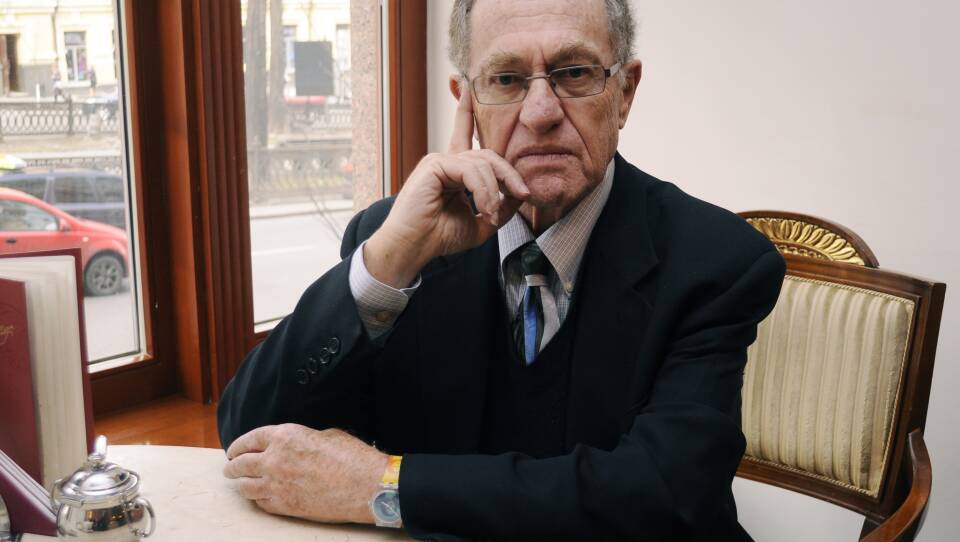Many legal scholars have defended the articles of impeachment against President Trump that were passed by the House this week, but some have been critical. Among them is Harvard law professor Alan Dershowitz. He's often taken positions in defense of Trump during his time in the White House. Dershowitz spoke with WGBH All Things Considered anchor Arun Rath about impeachment. This transcript has been edited for clarity.
Arun Rath: First off, I have to ask this question: Are you currently working for the president in any capacity to offer legal advice or anything like that?
Alan Dershowitz: No, the only legal advice I offer is in the media, and he is free to listen and accept it or not accept it. But I am not in a lawyer-client or any kind of relationship with either the president or his legal team.
Rath: If he asked, would you give him direct advice?
Dershowitz: I wouldn't give him lawyer-client advice unless I agreed to be his lawyer. And I really can't comment on whether I will or have been asked to be his lawyer. But right now, I'm independent and my advice is the same advice I would have given Hillary Clinton had she been elected and were she subject to impeachment.
More Politics
Rath: Understood. So in an op-ed published in The Hill last week, you wrote that the articles of impeachment that have now been passed by the House don't satisfy the demands of the Constitution, which says a president can be impeached for treason, bribery or other high crimes and misdemeanors. Are you saying that the president has to commit a statutory crime, a crime that you or I could be charged with, in order to qualify for impeachment?
Dershowitz: No, no. He has to commit criminal type behavior. When the Constitution says "or other high crimes and misdemeanors," "others" obviously suggests that it has to be much like treason or bribery. It can't be anything as broad and vague as obstruction of Congress or abuse of power - those are precisely the kinds of criteria that the framers rejected. Those are the reasons why they wanted impeachment. They didn't want a president who abused his power, but they didn't accept that as a criteria. They could easily have done that. Instead, they said that we will only allow the impeachment of a president if he violates one of the four designated criterion. If he does that and has abused power, then that's an appropriate subject for impeachment. But finding one of the four criteria is a prerequisite to impeaching or removing a president.
Rath: Do you mean - and stipulating that you believe that this obstruction of Congress and abuse of power in these articles don't fall into that category - but are there things that would be impeachable offenses that are not specifically crimes?
Dershowitz: I think so, but they have to be criminal-like behavior. I mean, take, for example, bribery. Bribery wasn't defined by statute. There were very few federal statutes at the time the Constitution was drafted. Mostly it was common law. But we know what bribery means, essentially. If he had been indicted for bribery and the Senate and the House both said look, we'll define what bribery means, we're not going to look to any statute, I think that would have been proper. And they could have indicted, impeached him for bribery, and there was some suggestion that they were thinking about it. But they didn't do that, because I don't think they believed they had the evidence necessary to make that point, even broadly defining bribery. But the most important point is they rejected open-ended criteria that could be weaponized for partisan use. Hamilton said that the greatest danger would be an impeachment that was based on who had the most votes in the House or removal based on who had the most votes in the Senate. And that's precisely what we're seeing happen, and the reason we're seeing it is because of the use of open-ended criteria. Every controversial president since John Adams has been accused of abuse of power. And obstruction of Congress? That's part of our system of checks and balances. Right now, it seems like Nancy Pelosi is trying to obstruct the Senate by delaying furthering the articles of impeachment. She, too, could be accused of abuse of power and obstruction of the Senate. I wouldn't accuse her of that because those are too subjective, open-ended, and capable of being used as partisan weapons.
Rath: Could you explain to me, though, because obviously a term like abuse of power is very vague, but the particulars that are talked about are specifically using the political office to pressure a foreign government to provide dirt on a political opponent. That's alleged, we can't say whether or not that's true. But in terms of that as an action, doesn't it limit it to that, like future presidents would not have to do that, not just any kind of abuse of power by however we define it?
Dershowitz: No. Because he hasn't been charged with any of the things in the report. That wasn't voted on. What was voted on were two terms: abuse of power and obstruction of Congress, and those are the criteria. When somebody is charged with a crime, you look at the actual crime that he's been charged with in the indictment, not the underlying evidence or the underlying basis for it.
So I think the House of Representatives violated the Constitution when they impeached him on these two grounds, whatever else may have been in the background. If they thought he had violated some rule by talking to a head of state, they should have put that in the grounds for impeachment. That's what has been done previously with other grounds for impeachment, not broad general criteria. There have been a few instances where presidents have also been charged with abuses of power, and I think that was always a mistake, and I think historians have viewed broad criteria as dangerous. Certainly the framers did. The framers explicitly rejected maladministration, with James Madison saying it would be too broad, too open-ended. It would have the president serve at the will of Congress and make him more like a prime minister who can be removed by a vote of non-confidence and along partisan lines.
Rath: There's speculation now that House Democrats will keep holding onto the articles of impeachment and not send them to the Senate, using this apparently as leverage to negotiate terms for a Senate trial. Could you give us your thoughts on that?
Dershowitz: That would be unconstitutional. Either he has been impeached or he hasn't been impeached. If he hasn't been impeached, then they should announce that the impeachment isn't complete and the impeachment is not going into effect until the articles have been forwarded. They won't do that. The Speaker of the House won't do that. If he has been impeached, the Senate now has its job to do. It doesn't have to wait, by the way, for any articles to be turned over. I've searched the Constitution top to bottom. There's no mention of articles of impeachment, there's no mention of transfer or of people being sent over. Once the impeachment has occurred, it shifts to the Senate. The Senate has a right to establish its own rules and its own timetable. So right now, the Senate could announce that on January 2nd, the Chief Justice will preside over a trial of the president on these two articles of impeachment. It doesn't have to wait for anything to happen from the House.
Rath: For people who are news consumers, we've just heard you give a reasonable explanation of why these articles of impeachment are not constitutional. Similarly, it's not hard to find people on the air who are esteemed lawyers and professors making exactly the opposite argument. I don't know if you can answer this question, but I'm asking you how as a news consumer to make sense of this.
Dershowitz: Well, first of all, when you have doubts, you resolve it against impeachment. There is a concept in law known as lenity. When you have two possible interpretations of a statute that imposes some kind of sanction, you always interpret it in the way consistent more with the rights of the individual than the government. And particularly when you have something like impeachment, if you acknowledge that my views are reasonable and I acknowledge that views on the other side are reasonable, I think they're wrong but they're reasonable, I think you have to resolve doubts against impeachment, particularly impeachment along party lines, the kind that we've seen.









